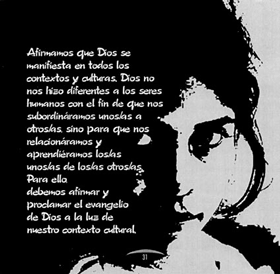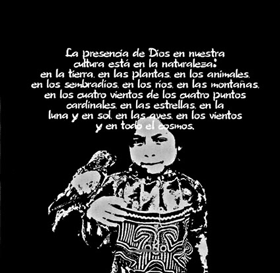
Reading the Bible from SISTERS eyes*
By Marilia Schüller
| "Bible and Gender" was the main theme of the first workshop of a training programme on reading the Bible from African Descendants' and Indigenous Women's perspectives. The workshop was held from 27 November to 5 December 2001, in San José, Costa Rica, in the Biblical University of Latin America, and was sponsored by the Latin American Council of Churches (CLAI) and the World Council of Churches (WCC). Sixteen women – six African Descendants and ten Indigenous women from nine countries and various denominations – brought their experiences of work in their own communities and the willingness to explore the theme and to learn. The training programme aimed at providing tools for reading the Bible from a gender, race/ethnicity and class point of view, as well as at equipping the women to multiply learning in their local churches and communities. In a long term, the programme will also help them write Bible studies that can be used as resource material for other women - and men . in their own and other communities. The methodology used in the workshop emphasised four points: cycles of community life; women’s lives in the community and in the church; a reality-based/contextual approach underlining sociocultural, religious, economic and political realities; gender analysis theory and biblical interpretation. A popular Latin American method was used to analyse the diverse realities the women come from. This method follows four steps: 1. Seeing: this helps participants describe and dia-gnose the social, economic, educational and religious aspects of their own, their families', churches' and communities' reality. 2. Discerning: what does the Bible say about those realities? What are the challenges before us as Christians to transform those realities? 3. Acting: this step aims at defining how to transform the realities. The women ask themselves: What should be transformed? How? When? Where? Using what strategies? With which partners? 4. Celebrating: this is the ongoing invocation of God's presence in the life of the community. It involves gratitude for transformation, and the possibility of celebrating hope in life. |
|
| The main elements in the workshop programme were: telling and listening to the women's life stories, and popular readings of the Bible through women's eyes and from a gender perspective. Some of the tools used were: plenary sessions, group work, Bible studies, videos, presentations on the general and on specific themes (such as women's participation in leadership training, in the life of the church, health and wholeness). Community prayers and healing rituals also helped the meeting achieve mutual solidarity. Reading the Bible through women’s eyes For a long time, women had no access to study of the Bible, which was restricted to priests and pastors. But in the 1970s and '80s, people all over Latin America began to read the Bible again, and Liberation Theology became more known. Whether they were Catholic or Protestant, the women who did theology worked from the reality of poor women, and many of them were working on literacy. |
 © WCC photo |
| These women read the Bible in search of knowledge about how women, like Esther or Deborah, participated in the history of their peoples and in the Judeo-Christian history of salvation. Nevertheless, there was still little questioning of gender relations at that time. In Latin America, women were still playing the same traditional roles in the life of the church, and in the domestic domain. At the end of the '80s, many women began to study theology, and to work in theological institutions. That helped strengthen the process of reading the Bible through women's eyes. The search for the feminine in God, for instance, was one of their objectives. In their theological reflections the women affirmed that men and women are created in the image of God. Reading the Bible using gender analysis as a tool became more popular in the '90s. That led women to read the Bible from their own personal contexts, but with a focus on relationships rather than on their individualistic, isolated experiences. It was established that Bible reading is conditioned by a myriad of factors, including one's ethnic, racial, socio-economic, gender and age status. Genesis 1 and 2, Kings 4:1-7, 2 Samuel 11:1-27, |
 We affirm that God is manifest in all contexts and cultures. God did not create us different from each other so that we should subordinate each other but so that we should relate to and learn from each other. Therefore, we need to affirm and proclaim the Gospel in our cultural contexts. © Iván Balarezo Pérez
|
| 1 Corinthians 11:2-16, Ephesians 5:21;6:1-9 and John 20:10-18. To help us understand the these texts, the following questions were asked: • What are the texts telling us, and what is the resemblance with present realities? • What differences can be identified, and how do we explain those differences? Each question was discussed in groups, and shared in plenary sessions. This exercise revealed the different contexts in which the biblical texts were written, and their history. Subsequently, the participants used this information to interpret their political, economic, religious and socio-cultural realities, and relate them to the Bible and to the community. In this interpretative cycle, the women understood that reality needs to be taken into account at all times. Additionally, new questions arise along the way in relating the experiences presented in the texts to our own experience, and this leads us to a new understanding. • make a contextual analysis of reality • identify gender, class, racial/ethnic elements • analyse the situation of the women in the texts in relation to our own contexts and in dialogue with women's present realities • identify the message for African Descendants and Indigenous women today • define the parallels between the women in the texts and our own life experiences. Participants also reflected on the impact and contributions that such texts could make to the lives of their own churches and communities. Follow-up Marilia Schüller is programme executive for Combating Racism, Justice, Peace and Creation team of the WCC. * (on the basis of the Report of the "Bible and Gender" workshop) |
|
